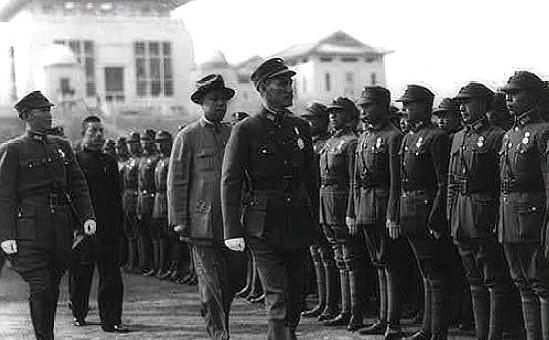Before the outbreak of the War of Liberation, the Nationalist army had an absolute superiority in both strength and weapons and equipment. Coupled with the support of the United States behind it, the old Chiang Kai-shek was full of confidence and boldly said that it would take only one year to end the war. In the first year after the outbreak of the Liberation War, the Nationalist army did occupy a certain advantage on the battlefield, but from the second year onwards, it began to decline, and more and more Nationalist troops were surrounded on the battlefield. In order to rescue these troops surrounded by our army, the Nationalist army organized many operations to break the siege. So among the many senior generals of the Nationalist Army, who is the first master of siege relief? Brother Shuo believes that it is none other than Zhong Song.

Zhong Song is a native of Songyang, Zhejiang Province, and after graduating from normal school, he returned to his hometown to become a primary school teacher. In 1924, after learning the news of the enrollment of the first phase of Huangpu, Zhong Song quit his job as a teacher and went to Guangzhou to apply for the examination, and as a result, he and Du Yuming, Hu Zongnan, Guan Linzheng, Yu Jishi, Huang Wei and others became alumni of the same period. Unexpectedly, shortly after the start of the school, Zhong Song fell ill with typhoid fever, and as a result, the school doctor of the military academy misdiagnosed him as a terminal illness, thanks to the timely discovery of his fellow villager Zhang Shuqing, he saved Zhong Song's life.
However, after such a delay, Zhong Song delayed a lot of studies, so after recovering from his illness, he could only enter the Huangpu Phase II to continue his studies. After graduating from the military academy, Zhong Song successively participated in the Eastern Expedition, the Northern Expedition, the Jiang-Gui War and the Central Plains War, and was promoted to the commander of the Supplementary Second Brigade because of his military achievements. After the outbreak of the War of Resistance Against Japanese Aggression, Zhong Song led his troops to participate in the Battle of Songhu, the Battle of Lanfeng, the Battle of Wuhan, and the Expeditionary Force's overseas combat, and his performance was outstanding, and he was awarded the Order of the Blue Sky and White Sun for his military merits.
After The surrender of Japan, Hu Zongnan, who had hundreds of thousands of heavy troops, became a veritable king of the northwest, and Zhong Song was also transferred to the northwest battlefield at this time as the commander of the reorganized 36th Division. Soon after, the Liberation War broke out, and Zhong Song, with his outstanding military talents, soon became the number one fierce general under Hu Zongnan. Due to the considerable study of our army's tactics of encircling points and providing assistance, many tasks to relieve the siege were entrusted to Zhong Song to complete. In July 1947, the Northwest Field Army surrounded Yulin with the strength of two columns, and Deng Baoshan hurriedly asked Hu Zongnan for help, and Hu Zongnan did not think about it, so he entrusted the task of relieving the siege to Zhong Song.
In order to prevent being ambushed by our army, Zhong Song did not go on the main road, did not sit in the car, led the troops out of the Great Wall and went directly into the desert, and after eating sand in the desert for a few days, suddenly appeared under Yulin City, leaving our army's reinforcements far behind. At this time, our army was facing the danger of being caught between the enemy's internal and external attacks, and General Peng resolutely led his troops to withdraw from the siege. Zhong Song was awarded a fourth-class Baoding Medal for his outstanding performance in this siege relief operation. Soon after, Zhong Song repeated his old trick and bypassed the ambush circle of our army and lifted the siege of Yuncheng.
Bypassing the ambush circle of our army twice in a row, and successfully unblocking the besieged Nationalist army, among the many senior generals of the Nationalist army, except for Zhong Song, there was no second person who had ever done it, so it is not an exaggeration to call him the first master of the nationalist army. However, such a fierce general was eventually regarded by Hu Zongnan as a scapegoat for the defeat of Feng Yuan's battle, and faded out of the military. After the total defeat of the Kuomintang, Zhong Song went to Hong Kong to make a living as a restaurant and later settled in the Netherlands. On March 16, 1988, Zhong Song returned to his hometown of Songyang to visit his relatives and donated 10,000 yuan to build a road for the local area. At that time, the average monthly salary in China was only about 100 yuan, and it took several years to save ten thousand yuan, so the money donated by Zhong Song was also a huge amount of money at that time. In March 1995, Zhong Song died of illness in the Netherlands at the age of 95.
For more exciting content, come and follow Brother Tsubasa's history class